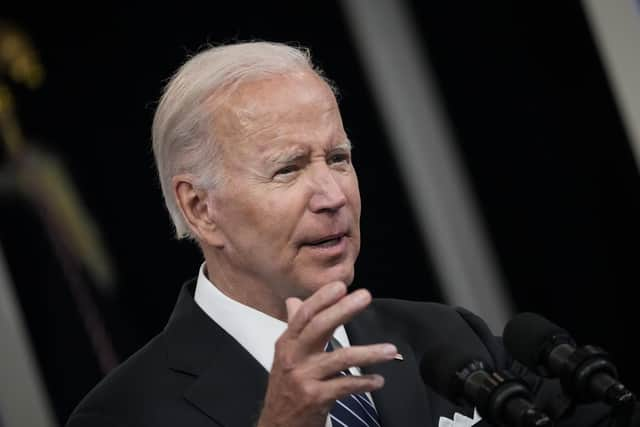How long will the West’s resolve hold on the Russian invasion of Ukraine - Patrick Mercer
First, the fighting. Obviously, economies, materiel and manpower will permit and constrain combat, but this war, in particular, will be decided on the battlefield. First, relatively small numbers of Russian troops are killing and injuring large numbers of Ukrainians daily whilst making slow progress in the Donbas. Of course, the Russians suffer themselves, but vast artillery bombardments against easily located defensive positions have left the defenders vulnerable.
Faced by redoubts and trenches reminiscent of Passcendaele, Moscow’s men are creeping forward, despite Ukrainian counter-attacks, but I predict that the Donbas will probably fall as the bad weather sets in. That will fulfil one of President Putin’s main goals.
Advertisement
Hide AdAdvertisement
Hide AdMeanwhile, Kharkiv in the north, Kryvki Rih west of the Dneiper and a number of other key cities will receive attention, but all eyes will be focussed on the rich, coastal areas of the south and Kherson in particular. Strategically vital, Kherson was captured early in the invasion and sits on the west bank (ie the Ukrainian side) of the great defensive obstacle, the Dneiper river. Russia needs to hold it if she is to sweep further west and capture the remaining ports on the Black Sea and seal-off Ukraine economically.


To frustrate this, though, Kiev’s commanders - in a militarily curious move - telegraphed that a vast counter-attack was planned against Kherson starting on August 6 and, certainly, large numbers of troops, artillery, aircraft and kit were assembled there. Yet, beyond some precision missile attacks on the vital bridges, nothing much else has happened. In turn, this has allowed a Russian counter-counter-attack which seems to have stymied Ukrainian operations whilst the world’s attention is distracted by the nearby Zaporizhzhia Nuclear Power plant.
This toxic giant is occupied by Russian troops who are using it as a base and, unsurprisingly, being shelled by Ukrainians, but there are also claims that Russia has mined it against the possibility of being overrun. Now, I don’t know the truth, but both sides are playing with a monster which, should it be heavily damaged, would dwarf the Chernobyl disaster.
So, it’s all going Russia’s way, is it? No: Moscow’s running out of men and kit at an extraordinary rate with their scanty advances unlikely to progress much further once the weather adds to shell damage to make the roads almost impassable and limiting air cover.
Advertisement
Hide AdAdvertisement
Hide AdUkraine, though, needs to strike a major blow very soon for morale’s sake, to keep Western fatigue at bay and ensure that the $7bn a month of aid, which President Zelensky says he needs, keeps rolling in. But, just like their foes, Kiev’s forces need to survive a winter when Moscow will weaponise the energy it’s providing to the West (most notably Germany) in a ruthless effort to ease sanctions whilst trying to fracture the resolve of NATO and the EU. Above all, Russian pressure needs to be relieved whilst a new army is raised, equipped and trained for offensives next spring.
All this, though, is set against a strategically changed Russia. Despite heavy casualties, sanctions and embarrassment over the debacle around Kiev at the start of the campaign, I believe that President Putin may still have been amenable to negotiations until relatively recently. He’s sticking to the chimera of a ‘Special Military Operation’ for the time being - in other words, hostilities short of all-out war - but passing laws which put his industry onto a war footing and allowing Mr Lavrov, his shrewd foreign minister, to talk about operations deep into Ukraine, far beyond his original, stated goals.
Meanwhile, Tuesday’s attacks on the Crimea must have been very carefully considered by Kiev. This peninsula is the Kremlin’s jewel: it’s viewed as sacred land with any strike there guaranteed to provoke escalation and retaliation. It also begs the question about newly ‘liberated’ territories such as Luhansk and, shortly Donetsk.
Moscow’s announced that referenda will take place in these districts in a few weeks’ time with Russian passports and the rouble already being introduced. Now, the results are a forgone conclusion and these territories will, de facto, become Russian making any Ukrainian attacks a substantive act of war. None of this has happened by accident, though: these are devious, calculated measures designed to test Kiev’s and the West’s resolve to the point of destruction.
Advertisement
Hide AdAdvertisement
Hide AdYet, in parallel with this came an article written by President Biden which suggests a change of Whitehouse policy. The New York Times ran the piece under the headline “What America Will and Will Not Do in Ukraine”, with the President seeming to threaten the West’s umbilical chord to Kiev with the ominous phrase, “I will not pressure the Ukrainian government - in private or public - to make any territorial concessions”.
But what territorial concessions are these: nothing like this has been discussed for months?
Now, I’m sure that a shaken Russia is preparing for war to the knife, so what is America doing by even hinting that Ukraine might concede an inch of her soil?
This wasn’t another Biden gaffe: it was a carefully polished article in which every word had been weighed.
Comment Guidelines
National World encourages reader discussion on our stories. User feedback, insights and back-and-forth exchanges add a rich layer of context to reporting. Please review our Community Guidelines before commenting.